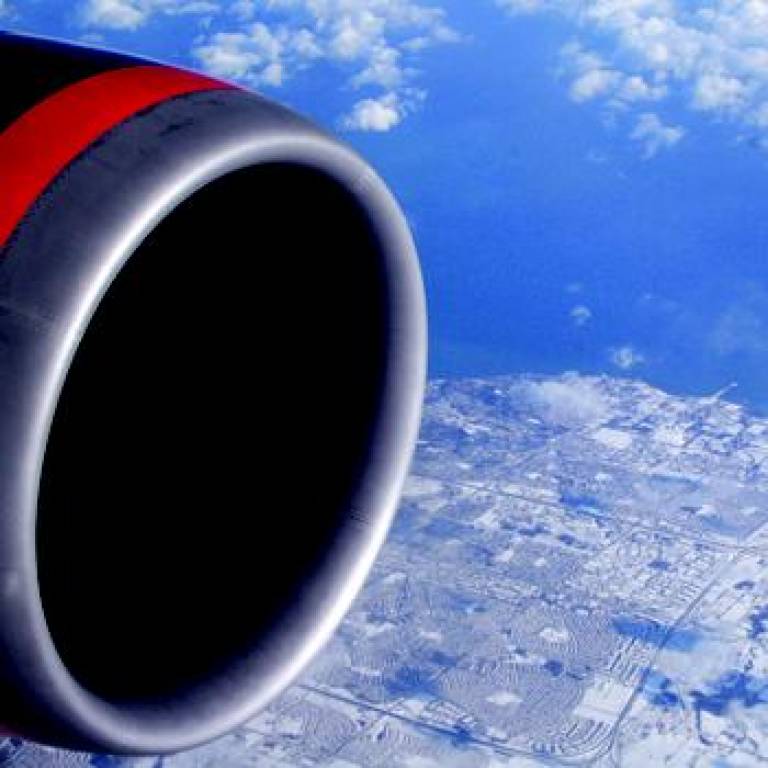Environment Institute strives to shrink carbon footprint
3 November 2009
Links:
 ucl.ac.uk/environment-institute/" target="_self">UCL Environment Institute
ucl.ac.uk/environment-institute/" target="_self">UCL Environment Institute
Be the change you want to see in the world, said former UCL student Mahatma Gandhi - and staff at the UCL Environment Institute are acting on his advice.
Staff calculated the carbon footprint of their work-related travel as part of an ongoing attempt to reduce the institute's impact on the environment.
The study was based on the movements of a total of 12 staff and three PhD students during the 2007/08 academic year.
The staff based their calculations on guidelines from the Department for the Environment, Food and Rural Affairs (DEFRA).
They used the guidelines to calculate precisely how much carbon was emitted in the course of their work-related travel.
Each member of staff was asked to complete a questionnaire detailing their movements during a working week.
The questionnaire covered both daily commuting and 'one-off' travel and broke down journeys into different modes of transport.
After the distance travelled had been converted into carbon emissions, the results showed that:
- The total carbon dioxide emissions for staff in 2007/08 amounted to 29.64 tonnes as a result of 231,700 kilometres of travel - an average of 2.5 tonnes per person.
- Of the total emissions, about 23 tonnes (77%) were the result of air travel and 5.5 tonnes (18%) were the result of train travel.
- Travel to 'one-off' events far outweighed commuting travel in terms of carbon dioxide emissions, amounting to 81% of the total.
- Flights were by far the most significant source of carbon dioxide emissions for these 'one-off' journeys - in fact, 77% of total emissions were attributed to air travel alone.
- The distance covered by aircraft was only 55% of the total, illustrating the higher carbon cost of flying, and these emissions are even more significant because releasing carbon dioxide at altitude has a greater impact on the climate.
The study concludes that the best approach to reducing carbon dioxide emissions is to try to avoid travelling in the first place and use other means of communications - for example, video conferencing.
When this is not possible, opting for a lower impact means of transport - such as train instead of plane - is another way to drive down emissions. A common substitute is to offset emissions by helping to fund a project designed to sequester carbon dioxide.
Professor Yvonne Rydin - a co-author of the study - said: "The carbon emissions associated with international air travel are a major challenge for academics and researchers. There is a strong imperative to travel to conferences and meet research collaborators, as well as to undertake fieldwork.
"As a community we urgently need to look into this issue. Video conferencing, etc, can help but, given the centrality of face-to-face meetings and work in the field to what we do as academics, there is really no alternative to finding a robust and positive off-setting scheme to make our research carbon neutral.
"This report also shows the value of internships. The main researcher on the project came to the UCL Environment Institute courtesy of an UrbanBuzz-funded internship organised by London Sustainability Exchange.
"Laurence Fahrni was a physic graduate from Imperial College who used his internship to learn more about environmental issues and the possibilities of further study in this area."
The Environment Institute is encouraging other departments at UCL to use the same methodology to perform their own calculations - and take steps to reduce their impact on the environment.
The study, which can be downloaded as a PDF at the link above, was co-sponsored by UrbanBuzz, a joint venture between UCL and the University of East London to stimulate new thinking about how we can create sustainable communities.
Image: view from a plane window (courtesy Dr Andrew Reynolds)
UCL context:
The UCL Environment Institute is the focal point for environmental research and related activities at the university. Through its website it provides a single gateway to information about research on the environment and advanced teaching.
Earlier this year UCL launched its Grand Challenge of Sustainable Cities. The university is bringing its multi-disciplinary expertise to the complex and systemic problem of how to create a sustainable urban environment.
Related stories:
UCL shortlisted for outstanding contribution to sustainable development
UCL podcast: Professor Mark Maslin on the launch of Sustainable Cities
 Close
Close

